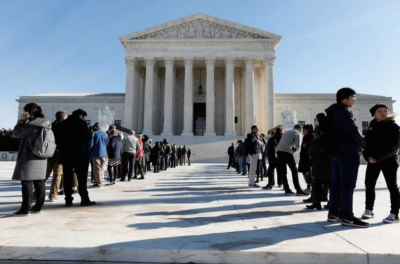2 reasons the Supreme Court has become so divisive

Sen. Mitt Romney announced his support for a process whereby the Senate could confirm a nominee to the Supreme Court before Election Day. His statement seems to ensure that a candidate could be confirmed barring missteps by the nominee during the confirmation process.
This process has become extraordinarily contentious for two reasons. One is obvious; the other is less so but even more fundamental to our nation and her future.
Why the Republicans will nominate a candidate
Ruth Bader Ginsburg and Antonin Scalia were known as fierce advocates for liberal and conservative philosophies, respectively. However, Justice Ginsburg was confirmed to the Supreme Court in 1993 by a vote of 96–3; Republican leaders Bob Dole and Mitch McConnell voted for her. Justice Scalia was confirmed in 1986 by a vote of 98–0; Democrat leaders Al Gore, John Kerry, Ted Kennedy, and Joe Biden voted for him.
That was then; this is now.
When Merrick Garland was nominated by President Barack Obama for the Supreme Court following Justice Scalia’s untimely death in 2016, the Republican-led Senate refused to consider his candidacy. Senate Majority Leader Mitch McConnell explained that not since the 1880s had the US Senate considered an election-year Supreme Court candidate put forth by a president from the opposition party.
When Justice Ginsburg died last Friday, Sen. McConnell quickly announced that the Senate would consider a candidate put forward by President Trump, since both the Senate and the White House are led by the same party. Nonetheless, many have condemned his decision as hypocrisy, given that this is once again an election year.
Critics are also claiming that there is not enough time before the November 3 election to investigate a candidate appropriately. However, of the 163 nominations in US history to the Supreme Court, more than half were formally nominated and confirmed within forty-five days. Justice Ginsburg’s process took forty-two days; Sandra Day O’Connor was confirmed in thirty-three days.
To this point, it might seem that I am defending Republicans against Democratic charges of hypocrisy and unfairness. In the interest of fairness, it is plausible to suggest that if the roles were reversed, many Republicans would be saying the same of Democrats that Democrats are saying of Republicans.
Therein lies my second point.
“Only a virtuous people are capable of freedom”
I am reading Jonathan Sacks’s magisterial new book, Morality: Restoring the Common Good in Divided Times. I’m halfway through it and already consider it the most important book I have read this year. The author was the Chief Rabbi of the United Hebrew Congregations of the Commonwealth in the UK for more than two decades. He is the recipient of the Templeton Prize among numerous other recognitions.
A review of what I have read so far would take far longer than space permits today. However, I want to focus on one insight I find to be enormously profound and urgent.
Rabbi Sacks correctly claims that morality is essential to a healthy society and its freedoms. He quotes George Washington: “Human rights can only be assured among a virtuous people.” And Benjamin Franklin, who noted: “Only a virtuous people are capable of freedom.” A team cannot win if its members do what they want to the exclusion of what is best for the team. An orchestra cannot perform well if each member plays what they want rather than what the conductor directs.
When a society loses its collective moral compass, it outsources moral standards to the government to legislate morality. But Rabbi Sacks warns that this cannot work: “Morality cannot be outsourced because it depends on each of us. Without self-restraint, without the capacity to defer the gratification of instinct, and without the habits of heart and deed that we call virtues, we will eventually lose our freedom.”
Why the Court has become so divisive
How is this discussion relevant to the Supreme Court?
Many Americans began abandoning biblical sexual morality decades ago. Many other Americans have resisted the epidemic of sexual immorality that has resulted, along with redefinitions of marriage and gender. Our elected officials represent and reflect these deep divides and thus have been unable to enact legislation with regard to abortion, same-sex marriage, and LGBTQ rights.
Those seeking such “rights” appealed to the courts. In my view (shared by many), the Supreme Court adopted a legislative rather than a judicial role when it then discovered rights to abortion, same-sex marriage, and LGBTQ advocacy that clearly are not articulated in the US Constitution.
Now that the Supreme Court has become a means of legislating morality which advocates are unable to advance through our elected governance, fights over the court’s membership and future have become more vociferous than ever before.
A calling beyond compare
Today’s article leaves Christians with this familiar but urgent fact: “You are the salt of the earth . . . You are the light of the world” (Matthew 5:13, 14, my emphasis). Jesus’ definite articles show that the world has no other salt or light but God’s people. When we speak and obey God’s word in God’s Spirit for God’s glory, God uses us in ways he can use no one else.
Members of the Supreme Court come and go, but “kingship belongs to the Lord, and he rules over the nations” (Psalm 22:28). One day, he assures us, “The earth shall be full of the knowledge of the Lord as the waters cover the sea” (Isaiah 11:9).
In the meantime, we are God’s agents of moral change in an immoral world. This is a calling beyond compare and a purpose worthy of our lives.
Max Lucado noted, “Thanks to Christ, this earth can be the nearest you come to hell. But apart from Christ, this earth is the nearest you come to heaven.”
With whom will you share those facts today?
Originally posted at denisonforum.org
Adapted from Dr. Jim Denison’s daily cultural commentary at www.denisonforum.org. Jim Denison, Ph.D., is a cultural apologist, building a bridge between faith and culture by engaging contemporary issues with biblical truth. He founded the Denison Forum on Truth and Culture in February 2009 and is the author of seven books, including “Radical Islam: What You Need to Know.” For more information on the Denison Forum, visit www.denisonforum.org. To connect with Dr. Denison in social media, visit www.twitter.com/jimdenison or www.facebook.com/denisonforum. Original source: www.denisonforum.org.



























